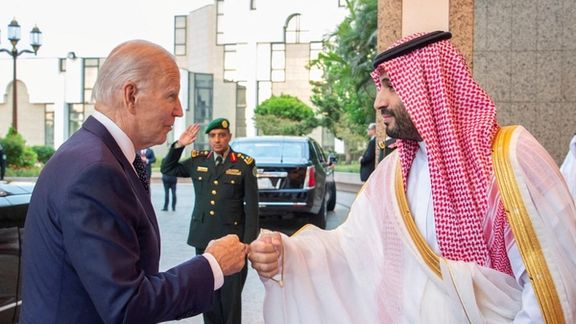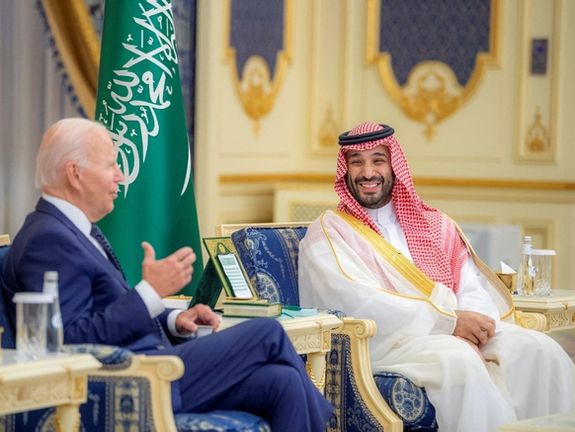Biden Meets MbS As He Arrives For Arab Summit Focused On Iran

US President Joe Biden began his Saudi Arabia visit Friday with journalists and photographers looking for any signs revealed by choreographed meetings.

US President Joe Biden began his Saudi Arabia visit Friday with journalists and photographers looking for any signs revealed by choreographed meetings.
Air Force One touch-downed at 6pm local time, following a direct flight from Israel to Saudi Arabia portrayed by United States officials as evidence of Saudi Arabia’s decision to allow Israeli overflights. Biden headed to the Jeddah al-Salam royal palace where he fist-bumped Crown Prince Mohammed bin Salman before pictures showed him in an ornate diwan with 86-year-old King Salman bin Abdulaziz.
This was not the decidedly low-key welcome for President Barack Obama in 2016 after he had suggested in Atlantic magazine that the Saudis needed to “share” the region with Iran. But neither was it the flamboyant welcome for President Donald Trump in 2017, when the former reality television star joined in a sword dance.
Nonetheless, within minutes of Prince Mohammad greeting the president, the Saudi Foreign Ministry website posted pictures showing them together.
Biden’s regional tour is attempting to balance various pressures and interests. The summit meeting Saturday of the Gulf Cooperation Council countries with Egypt, Iraq and Jordan, will have Iran high on the agenda, and is expected to give some endorsement to developing air-defense cooperation with Israel aimed primarily at Iranian drones and missiles.
But despite a threat of force in the last resort to stop an Iranian bomb, Biden also was clear in Israel that he remains committed to diplomacy aimed at reviving the 2015 Iran nuclear deal, the JCPOA (Joint Comprehensive Plan of Action), which the Israeli leadership opposes.

Although media attention in the US has focused on prospects for the Saudis pumping more oil and relieving inflationary pressures that have sent American gasoline prices towards $5 a barrel, US National Security Adviser told reporters en route to Jeddah that any action would be “done in the context of Opec+.” The grouping of oil producers, led by Saudi Arabia and Russia, has agreed only modest adjustments to cutbacks during the worst of the Covid-19 pandemic and is not due to meet until August 3.
Some analysts argue that Saudi Arabia and the United Arab Emirates are hedging as they see Biden trying to follow Trump in reducing the direct US role. Hence both have developing diplomatic contacts with Iran and have not cut back ties with Moscow despite the Ukraine crisis.
Divided Democrats
With so many international uncertainties, a sense that Biden may be a one-term president has been enhanced both by Democrats critical of his leadership and by polling evidence. A New York Times/Siena College poll published this week found 64 percent of Democrat voters saying they wanted someone other than Biden to stand in 2024, with his age at 79 years (33 percent) vying with this performance (32 percent) as the main reason.
‘Progressive’ Democrats are uneasy both about Biden’s performance in Israel, when they feel he failed to highlight Palestinian rights, and his developing relationship with the Saudi crown prince, who US intelligence reported was involved in planning the 2018 murder in Turkey of Washington Post journalist Jamal Khashoggi.
NBC News reporter Peter Alexander wrote on Twitter than a Saudi aide “grabbed my arm tightly” after he shouted “Jamal Khashoggi, will you apologize to his family?” Both Prince Mohammad and Biden ignored the question.
But there are also Democrats who believe – alongside many Republicans – that Biden, regardless of human rights issues, should press ahead with building new regional security arrangements including the Saudis.
Ahead of Biden’s regional trip, Robert Menendez, the Democrat Chair of the Senate’s Foreign Affairs Committee, issued a statement Tuesday arguing he needed to “unite regional actors as a strong counter-weight to an Iran intent on bolstering its nuclear capabilities and menacing its neighbors.” Menendez opposed the JCPOA in 2015 and said in May its revival was not in US interests.